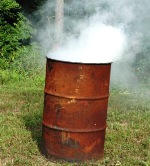
Wisconsin DNR Reminds Residents of Trash Burning Rules
The state agency says that burning trash and landfilling or burning recyclable materials are prohibited by state law.
Anyone taking a match to a debris pile this spring may want to think twice. If the pile contains household trash, the fire will be adding dangerous pollutants to the air.
A study by the U.S Environmental Protection Agency found that the amount of cancer causing dioxin and furan emissions from 15 households burning trash each day is the same as those emissions from a 200-ton-per-day municipal waste incinerator with high efficiency emission control technology.
"Burning any material, whether plastic, paper, or wood, produces a variety of hazardous and toxic air pollutants, including carcinogens such as arsenic, benzene, and formaldehyde. Children and others with asthma are especially at risk from smoke from burning garbage," said Jim Zellmer of the Department of Natural Resources waste and materials management program. “If you burn trash, you’re affecting your health and the environment more than you know. Where there’s smoke, there's pollution,” he added, “and other risks.”
Because of its environmental risk, burning trash in Wisconsin is illegal. In addition, Wisconsin's recycling law and local ordinances prohibit landfilling or burning recyclable materials. Agricultural and horticultural plastics like silage film, haylage bags, bale wrap, woven tarps, nursery pots, and trays must also be recycled or landfilled. It is also illegal to burn plastics in Wisconsin. Materials that are not recyclable should go to a legal disposal facility, not a burn barrel or pile.
Materials that are legal to burn, such as leaves and brush, are regulated under state code. Burning permits are required for debris burns and only authorize the burning of legal materials.
Source: Wisconsin Department of Natural Resources